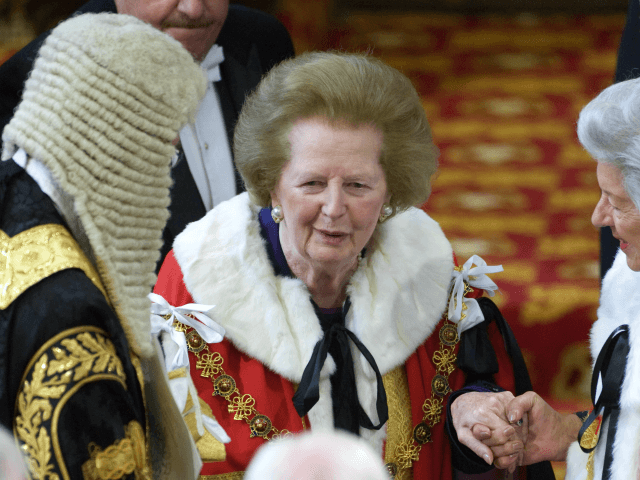The final volume of Margaret Thatcher’s authorised biography has confirmed that the late “Iron Lady” wanted Britain to leave the European Union.
The three-time prime minister, who governed from 1979 to 1990, backed remaining in the European Economic Community, as the EU then was, in 1975, and a number of Remainers have claimed she would have done so again in 2016 — despite her premiership being marked by a series of pitched battles with the bloc concerning the exorbitant sums of money it was extracting from British taxpayers and the ambitions of the Brussels establishment to build a United States of Europe.
“[T]he President of the European Commission, Mr [Jacques] Delors, said at press conference the other day that he wanted the European Parliament to be the democratic body of the [European Union], he wanted the Commission to be the executive, and he wanted the Council of Ministers to be the senate — no, no, no!” she told the House of Commons in 1990, following one such battle.
Mrs Thatcher — later Baroness Thatcher — was ousted without ever having lost an election by a cabal of europhile Tory MPs including Michael Heseltine, John Major, and the late Geoffrey Howe not long afterwards.
Now the final chapter of the late prime minister’s authorised biography, serialised in the Telegraph, has confirmed that she came to embrace a complete break with the expansionist bloc after her ouster — as her speeches against the Maastricht Treaty which transformed the European Community into the European Union and her eurosceptic post-premiership book Statecraft had hinted in her lifetime.
The biography reveals she wrote to the late Tory eurosceptic Sir Teddy Taylor saying that she had “always felt that the best answer for us was to be a kind of free-trade and non-interventionist ‘Singapore’ off Europe, seeking contact and understanding with the growth areas of the world, but I have a feeling that such a scheme is perhaps too revolutionary even for my fellow Eurosceptics here” in 1992.
She secretly confided that she had come to believe “we would be better off outside” to a number of people, the biography recalls — but she was persuaded not to go public with her views by aides, who feared the potentially divisive impact of such an intervention on the Conservative Party.
The revelations follow her old rival, former National Union of Mineworkers leader Arthur Scargill, issuing an improbable public endorsement of Prime Minister Boris Johnson’s decision to prorogue the parliamentary session — with the suspected aim of hampering the anti-Brexit activities of Remain MPs, although this was officially denied — after the Tony Blair-created Supreme Court decided he should not have done so.
The left-wing firebrand, like many “Old Labour” grandees — now few in number — is a fierce eurosceptic, and has condemned current Labour leader Jeremy Corbyn for turning his back on the cause, to which he too was committed before he won the party leadership.
“Jeremy Corbyn has been a personal friend of mine for 40 years,” the octogenarian political activist told the Burton Mail in late 2018.
“I am deeply saddened and feel that it’s a tragedy that he has adopted the position that he has and I have to feel that I condemn him for what he is doing at the moment,” he said.
“He is now doing the very thing that he previously fought against together with Tony Benn and me.
“We campaigned to come out of the European Union and out of the customs union.
“He’s now talking about having a customs union. That’s a betrayal — that’s all I can say.”

COMMENTS
Please let us know if you're having issues with commenting.